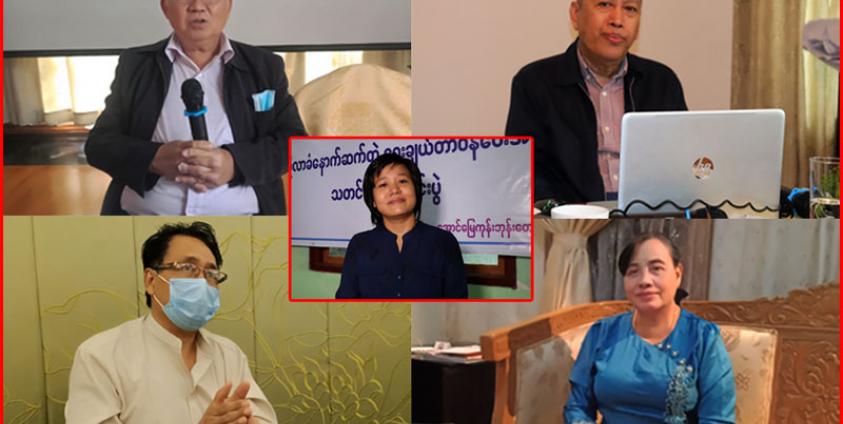The installation of a quasi-civilian government under former President U Thein Sein in 2011 and a subsequent push for peace by his administration brought hopes for an end to decades of civil war in Myanmar. But conflict has persisted, up to and through the term of a new National League for Democracy government that took power in 2016. A series of high-profile peace summits and negotiations under both administrations have yielded some agreement while also exposing significant divisions.
The most recent iteration of the Union Peace Conference — a forum launched under the previous government — was held last month, when Nationwide Ceasefire Agreement (NCA) signatories signed “Part 3” of the Union Accord. But several ethnic armed groups were absent from the three-day event, and fighting between the military and the Arakan Army in Arakan State shows no signs of abating.
Given the mixed results to date, DMG reporter Khaing Roe La asked five stakeholders to compare and contrast Myanmar’s peace process under the previous government and the current administration.
Padoh Saw Kwe Htoo Win
Vice chair of the Karen National Union
The peace processes of this current government and the previous government are different. Both sides were able to negotiate to reach the NCA amid difficulties. The building of the mechanism of the peace process is stronger.
In implementing the foundation [for peace], the thinking of the government will be different from the ethnic armed groups. Both sides face difficulties in negotiations because they cannot agree to our demands and we cannot agree to what they can give. So, we need to take time to balance between the federalism we want and the federalism they want.
U Hla Maung Shwe
Member of the Peace Advisory Committee
Under the previous [U Thein Sein] government, there were some limits to implementing the peace process. It had to work hard. The current government receives more international and public support. So, we can say it does not need to work as hard to implement it. But the current government has some experience and lessons learned. I do not know about the [upcoming 2020] election’s result, but if the current government takes office for another five-year term, there will be some changes in the peace process.
U Thwin Lin Aung
Member of the Working Committee of the CSOs Forum
Under the previous government, it was the beginning and the result could not be seen clearly. And the talks moved quickly because the stakeholders in the talks from the government and the Tatmadaw were familiar with each other. The Tatmadaw did not make the situation difficult.
But under this government, the government and the Tatmadaw are not familiar with each other, so the Tatmadaw might make the situation difficult in some cases. So, the process is a bit slower than the previous government. It is halting and takes time, I think.
Saw Mra Razar Lin
Arakan Liberation Party senior leadership
There were some difficulties to some extent in the beginning, under the U Thein Sein government. However, it saw success in the peacemaking process. Under the current government, it needed to take time because they are new to the process.
At the moment, the current result is a bridge to keep moving forward [with the peace process]. So, I do not want to say the challenges have been less or more under this or that government’s term.
In the beginning, both sides had difficulties. Then, both sides were successful and signed the accord. Now, Part 3 of the Union Accord has been signed to keep things going post-2020.
Saw San Nyein Thu
Chair of the Rakhine Women’s Initiative Organization
Under the U Thein Sein government, some ethnic armed groups signed mutual ceasefire agreements and the NCA. So, the National League for Democracy government that took office after the 2015 election needs to focus on ensuring the NCA non-signatories can sign the NCA, I think. The government, parliament, Tatmadaw and political parties need to try to get the remaining ethnic armed groups to sign the NCA.
But the government and other stakeholders did not create a situation in which the remaining ethnic armed groups would sign the NCA. So, we saw intensifying clashes between the Tatmadaw and ethnic armed groups that have yet to sign the NCA, in Arakan State and other regions. We had hoped the remaining ethnic armed groups could sign the NCA under the NLD government.








